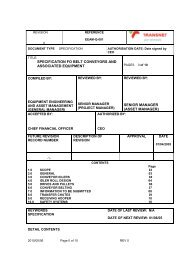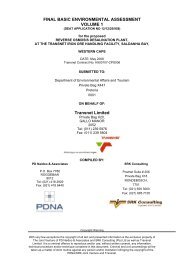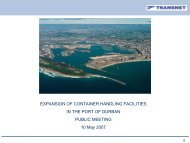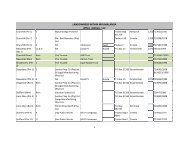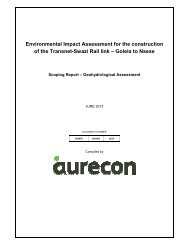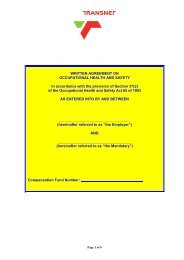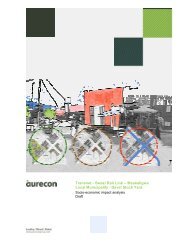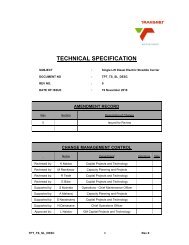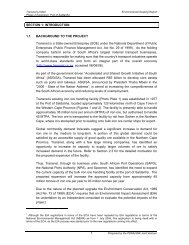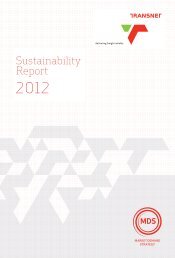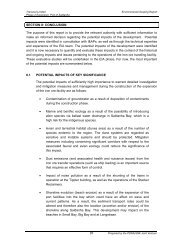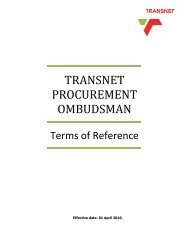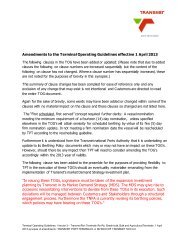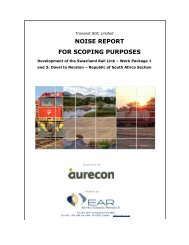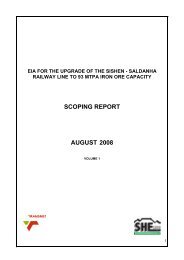Version1: Applicable from 1 April 2011 - Transnet
Version1: Applicable from 1 April 2011 - Transnet
Version1: Applicable from 1 April 2011 - Transnet
You also want an ePaper? Increase the reach of your titles
YUMPU automatically turns print PDFs into web optimized ePapers that Google loves.
13.2.2.2. Where a vessel in a single port stay calls at both the Bulk and Ro-Ro,<br />
Break-bulk and Agricultural berths, then the five day firm nomination rule<br />
as per clause 2.1.9 will apply.<br />
13.2.2.3. Should a vessel having submitted a five (5) day firm nomination, elect to<br />
cancel its Ro-Ro, Break-bulk and Agricultural call and only call at the bulk<br />
terminal, then such vessel will be treated as an early arrival and will either<br />
be berthed if a window is available or it will be required to wait for its<br />
scheduled bulk slot. Such vessel will not be required to nominate afresh<br />
and will not be treated as an opportunistic call.<br />
13.2.3. General Information<br />
13.2.3.1. In order to maximise capacity utilization, MBT will further undertake<br />
additional cargo rationalisation exercises that involves the migration of<br />
suitable small bulk parcel cargo to the Ro-Ro, Break-bulk and Agricultural<br />
Terminal at Richards Bay. During the implementation of this exercise MBT<br />
will, as an interim measure until further notice but in its sole discretion,<br />
permit the handling of parcels smaller than the minimum sizes reflected in<br />
Clause 13.2.3.2 and 13.2.3.3 below for both import & export cargo at MBT.<br />
13.2.3.2. The minimum export parcel that will be planned at MBT is ten thousand<br />
(10 000) Tons and deviations will be managed, in the sole discretion of<br />
TPT, on a case by case basis to suit clause 13.2.3.1 and until such time as<br />
further migration is implemented.<br />
13.2.3.3. The minimum import parcel that will be planned at MBT is fifteen thousand<br />
(15 000) Tons.<br />
13.2.3.4. Where TPT has accurate calibrated cargo scales in place to measure bulk<br />
exports via its cargo conveyor belts, then only one (1) additional run will be<br />
permitted provided that such additional run is no less than two hundred<br />
(200) tons. In the absence of accepted scales, all additional cargo belt runs<br />
will be managed to meet the export order requirements.<br />
13.2.3.5. Bulk vessels loading by means of the belt facilities must be able to handle a<br />
minimum loading rate of 1 000 tph except in instances where the cargo<br />
characteristics allow for a slower shipping norm.<br />
13.2.3.6. Weather sensitive cargo: In instances where Customers are prepared to<br />
ship cargo during periods of light rain, a letter to this effect must be<br />
presented at the Phase II. Vessels affected by rain will be treated in<br />
accordance with clause 5.<br />
Terminal Operating Guidelines: Version 3 – <strong>Transnet</strong> Port Terminals Ro-Ro, Break-bulk, Bulk and Agricultural Terminals: 1 <strong>April</strong> 2013<br />
TRANSNET PORT TERMINALS, A DIVISION OF TRANSNET SOC Ltd 66



